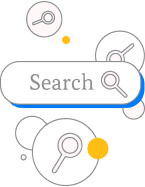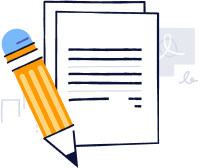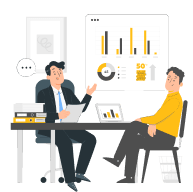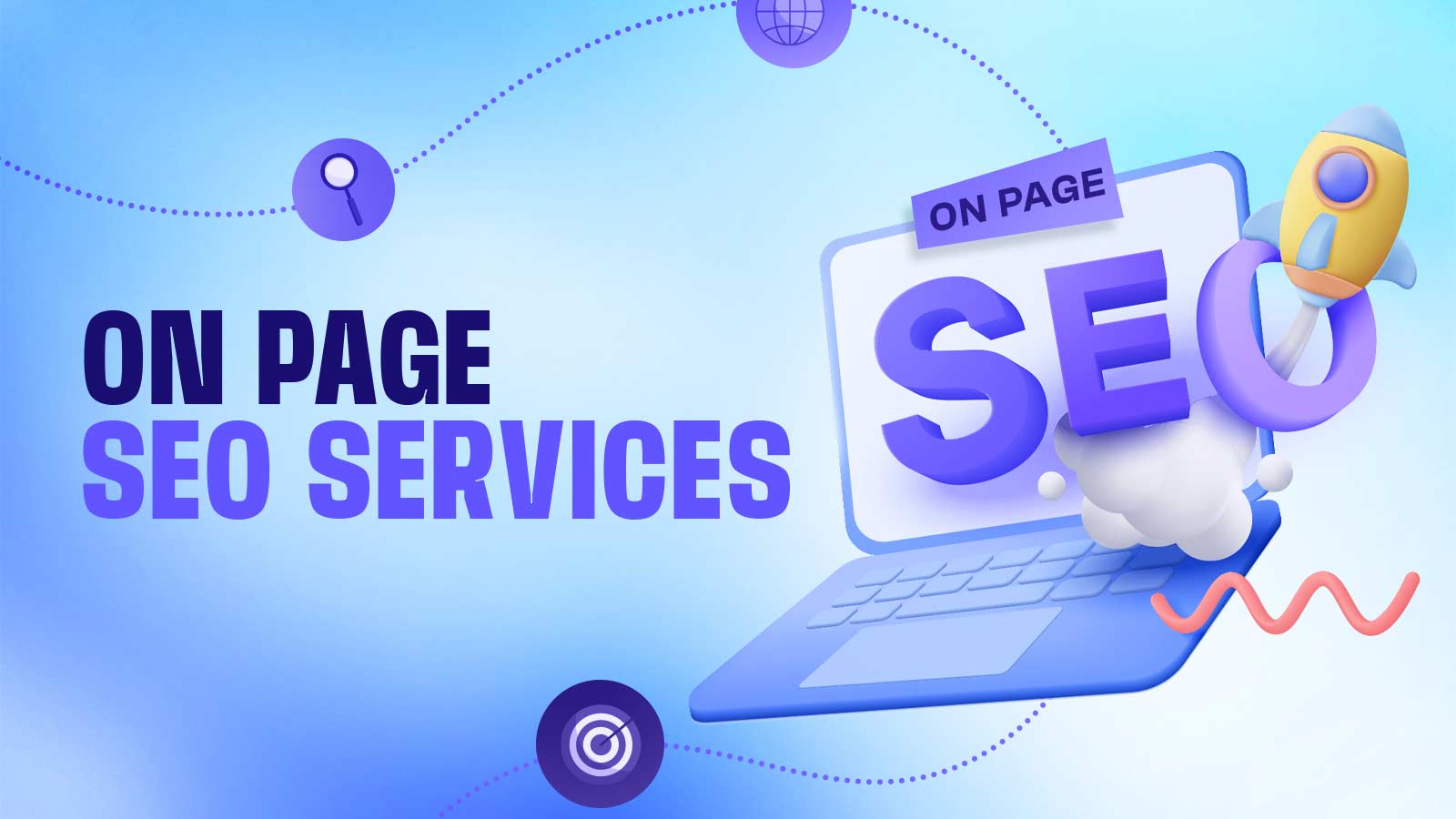
On Page SEO Services: Get The Best Exposure For Your Brand
When it comes to increasing a website’s exposure and online presence, on page SEO services are vital. Individual web pages are the primary emphasis of this subset of SEO, which aims to improve user experience and conform to search engine algorithms.
By strategically placing keywords, creating relevant content, and optimizing technically, on-page SEO strives to raise a website’s position in search engine results pages (SERPs). Websites with helpful, structured, and pertinent information tend to rank higher in search results.
Search engines and users both benefit from on page SEO service because it clarifies a page’s content and makes it easier for users to locate what they’re looking for. So, if you’re looking for on-page SEO services, it’s always better to opt for the best.
Why Is On-Page SEO Important?

On-page SEO gives you direct control of your hands to boost your business’s online presence. With advanced SEO services, you can see a change in your visibility and credibility in no time.
The Language Of Keywords: Connecting With Google
Your website and search engines, especially Google, can communicate more effectively with on page optimization service. Consider it as dropping hints, or keywords, that Google can understand. The first step in creating successful communication and making sure your material matches user queries is to strategically integrate keywords into your HTML.
Creating An Optimal User Experience To Welcome Visitors
Many mistakenly believe that on-page SEO is just about packing keywords; in reality, it’s more like welcoming guests to your website. Site visitors will have an easier time navigating and finding what they need on an optimized page, eliminating the need for a tedious digital treasure hunt.
Adjusting For The Content Ranking Factors Of 2024
If you want to rank well in 2024, you need an on page SEO expert. On-page SEO isn’t only about keywords anymore. Search intent, page loading speed, click-through rate, user experience, dwell time, and bounce rate are now essential optimization criteria.
Not only will search engines be able to find your content, but they will also connect with and hold the interest of your audience thanks to this comprehensive strategy.
Experience Optimization
When optimizing a page for search engines, user experience (UX) must be prioritized. It entails making sure that the content and layout of the pages are tailored to the tastes and actions of the users.
To improve user engagement with your website, on-page SEO should prioritize easy navigation, user-friendly layouts, and prominent calls to action.
Dealing With Bounce Rate And Dwell Time
In addition to bringing in visitors, on-page SEO tackles the problem of keeping them around. You can measure how effective your content is by looking at metrics like bounce rate and dwell time.
To optimize for these aspects, one must create captivating and relevant content that draws in visitors and makes them want to explore more, which in turn decreases bounce rates and increases dwell time.
Making Sure Content Is Relevant To Search Intent
To achieve success with on-page SEO, it is crucial to understand and address user search intent. It’s not enough to simply employ keywords; the content must address visitors’ specific needs. You may improve your visibility in search results and the efficiency with which you respond to user inquiries by adapting your content to match various search intentions.
Emphasizing Quick Page Loading And High Click-Through Rates
Quickness is of the essence in our digital age. Improved user experience and search engine rankings can be achieved through on-page SEO by making sure pages load quickly. Your content will be more successful as a whole if you optimize click-through rates by creating engaging meta tags and descriptions.
Oyolloo is the leading on page SEO agency that knows how important it is to implement on-page SEO for your betterment. Therefore, we have the experts to tackle every aspect of an on-page SEO checklist, and give you the perfect outcome.
What’s Included In On-Page SEO Services?

Experts will not leave any stones unchecked when it comes to your on-page SEO needs. Hereby, the most essential things are given below:
Keyword Optimization
The first step in on-page SEO is optimizing each page for certain keywords. To do this, you need to make sure that your page’s names, headers, and content all naturally incorporate relevant keywords.
To improve your material’s discoverability on search engines, strategically place keywords throughout. This will make your content more relevant to user search queries.
Optimizing Title Tags
Both humans and search engines form an initial impression of your website based on the title tag. One aspect of on-page SEO is creating attention-grabbing title tags that are loaded with keywords and give a summary of the page’s content. Both search engine results and clickthrough rates are greatly impacted by title tags that are not optimized.
Improving Meta Descriptions
Meta descriptions are a part of on-page SEO. They are summaries that give users an idea of what a webpage is about. Well-written meta descriptions do double duty: they boost clicks and inform search engines about the content’s relevance to user queries, which in turn affects the overall ranking.
Prioritizing Relevance And Quality In Content Optimization
An important part of on-page SEO is making sure your content is relevant to user intent and of high quality. Producing educational, interesting, and organized content that satisfies user needs and keeps them on the page for longer has a favorable effect on search engine rankings.
Using Header Tags
Experts in on-page SEO use header tags (H1, H2, etc.) to establish a hierarchy for the content. Improve your content’s readability and help search engines understand the information flow using well-structured headers. Indexing and ranking are both enhanced by this.
Maximizing The Potential Of Images
To maximize user engagement, it is essential to optimize images for both performance and aesthetics. Images can be optimized for faster download times, made more accessible by adding informative alt text, and made to match the overall content tone as part of on-page SEO services.
Effective Strategies For Internal Linking
Using efficient methods of internal linking is a part of on-page SEO. Incorporating these connections into your website improves navigation and user experience by leading users to other related pages. Further impacting the site’s structure as a whole, internal links help search engine crawlers comprehend the interconnections between various pages.
Optimizing URL Structure
An important part of on-page SEO is the structure of your URLs. Search engine optimization and user comprehension are both enhanced by URLs that are optimized for simplicity, relevance, and keyword inclusion. Both the number of clicks and the trust visitors have in a website are positively affected by its URL structure.
Optimizing For Mobile
Given the widespread use of mobile devices, on-page SEO services place a premium on making sure the site is mobile-friendly. You can boost your website’s search engine rankings and make users’ experiences better by making sure it works flawlessly on all devices and screen sizes. This is in line with Google’s mobile-first indexing policy.
Quick Page Loading Times
An important aspect of on-page SEO is how quickly a website loads. Page load times affect search engine rankings and the amount of time users spend on a website.
Page-specific search engine optimization focuses on improving the user experience and search engine rankings by enhancing the speed with which a website loads its pictures, scripts, and server answers.
On-Page SEO Factors That Improve Rankings

Along with the above mentioned aspects, there are some other things that newbies forget to do in your on-page SEO. but these hold significant importance when it comes to ranking.
Writing For Search Engines And Users
Search engine optimization writing is more than just stuffing your material with keywords; it’s about making sure it speaks to people and search engines alike. To make your content worthwhile and easy to find, focus on what users need and strategically add relevant keywords.
By creating high-quality content that answers user questions and gives them useful information, you may boost your on-page SEO and search engine rankings, which is in line with Google’s focus on user experience.
Balancing Targeted Pages With Keyword Cannibalization
To avoid keyword cannibalization, it is vital to carefully analyze how many pages target the same term. If there are too many pages using the same term, search engines will get confused and the impact will be diminished.
You can keep your keyword density in check and boost your page’s authority in SERPs by optimizing each page for relevant, specialized keywords without stuffing them.
Assessing And Improving Current Content
An essential part of on-page SEO is assessing your current content regularly. By following these steps, you may check if your material is correct, accomplishes its aims, and doesn’t duplicate itself.
To make sure your website has fresh, relevant, and interesting material, it’s a good idea to conduct a content audit to find out where you can improve. Your overall SEO approach will be improved by filling in gaps and optimizing current material.
Engaging Users
When it comes to on-page SEO, user engagement is just as important as getting traffic. Important parts of an effective SEO plan include keeping visitors, getting them to read material, and creating interest.
You may achieve long-term success in search engine rankings by optimizing pages, improving site performance, and concentrating on user experience. This will create an atmosphere that attracts users and makes them want to come back.
Does Traditional On-Page SEO Still Make A Difference In 2024?

When looking at the bigger picture of digital marketing in 2024, traditional on-page SEO is still fundamental. The SEO industry has changed over the years due to new algorithms and technologies, but the basics of on-page optimization are still important.
Important factors that tell search engines how valuable and relevant a page’s content is include keyword optimization, meta descriptions, title tags, and high-quality content.
Search engine algorithms still heavily rely on these classic on-page factors when deciding how to rank and display a website in search engine results pages.
Traditional on-page SEO methods greatly improve user experience with elements like mobile compatibility, fast website loading, and intuitive navigation. Search engines are always improving their algorithms to make users’ experiences better. Websites that follow these tried-and-true on-page SEO strategies have a better chance of ranking organically.
Although AI and voice search are changing the digital world, traditional on-page SEO is still essential for building a successful digital strategy. To achieve visibility, drive organic traffic, and develop a strong online presence in 2024 and beyond, optimization of on-page features will continue to be crucial.
Frequently Asked Questions (FAQs)
What is the on page SEO task?
Some important things to do in on-page SEO include using headers to organize material, include keywords in body copy, adding visuals, meta descriptions, alt-text optimization for images, and internal links, and optimizing the URL. By adjusting to these steps, a website can increase its exposure and relevancy to search engines, which in turn boosts its ranking and generates organic visitors.
What is the most important on page SEO factor?
When it comes to on-page SEO considerations, meta tags are essential. Meta tags are essential for search engines to understand the content and purpose of a website. They consist of elements like the Meta Title, Meta Description, Meta Keywords, and Meta Robots Tag. A webpage’s click-through rate, search engine ranking, and compatibility with user searches can all be improved by carefully crafting meta tags.
What is more important on page SEO or off-page SEO?
There is a difference between on-page and off-page SEO, although both are essential to any digital strategy. In on-page SEO, the focus is on improving a page’s ranking for certain keywords by enhancing its content and technical components within the website itself. When it comes to search engine optimization, off-page SEO is all about elements like external signals and backlinks and how they affect a page’s ranking.
What is the ideal on page SEO score?
An optimal on-page SEO score falls within the range of 80 to 100. This score shows that the website has done a good job of optimizing individual pages for search engines, which boosts its exposure and performance overall.
What Are You Waiting For?
Oyolloo has been the leading service provider for advanced SEO services, and our on page SEO services are a combination of everything. We don’t leave even the smallest thing unchecked. Thus, we make sure our experts get your business in the direction that you have been dreaming of for so long.
If you are considering professional on page SEO services for your business, don’t hesitate to contact our team. We have your back all the time!
